To Win Glorious Triumphs Even Though Checkered by Failure
Marketing major Gabby Marz believes that every new student that embarks on their academic path at Utah State University’s Jon M. Huntsman School of Business should visit the word mural on the north side of the ground floor of Huntsman Hall and read the Theodore Roosevelt quote that is illustrated there:
“Far better is it to dare mighty things, to win glorious triumphs, even though checkered by failure, than to rank with those poor spirits who neither enjoy nor suffer much, because they live in a gray twilight that knows not victory nor defeat.”
The typography of the mural emphasizes the Huntsman School motto to “Dare Mighty Things,” but Marz pointed out that two other words feature prominently in the artwork: victory and failure.
“It may seem odd to find the words victory and failure so close together,” Marz said. “I think this dichotomy is at the heart of what it means to learn by doing. Every mistake we make will lead us closer to the next learning victory. And for that reason, every failure and victory in our education is something to celebrate.”
Marz faced her moment of potential defeat when she took her first account- ing class at the Huntsman School. Up until that point, the classes of her chosen major, while rigorous, had come naturally to her. But accounting was a different learning experience. Determined to succeed in accounting, she attended many student-led tutoring sessions and sought the help of her professor who showed a genuine interest in helping her. Eventually, Marz was able to learn the material and receive a grade that she was satisfied with.
In describing the challenge, Marz realized that “my best doesn’t always look the same in every situation.”
As a student entering her senior year at Huntsman, Marz has immersed herself in the college experience. And even when facing difficulty, Marz radiates optimism and drive.
This indomitable work ethic has been ingrained in the school’s culture through Utah’s hardy pioneer heritage, industrious first-generation immigrants, and the school’s namesake, Jon Huntsman himself. He believed that every student – no matter the opportunities they were born into – could become an influential leader.

Jon Huntsman, pictured here when he was White House Executive Secretary for President Richard Nixon, experienced his own set of challenges as an entrepreneur, but firmly believed in the value of experimentation as a key to innovation and growth.
Most human beings are comparable to the proverbial "Unborn Masterpiece." They never know what talents they possess until they take the plunge. We each have within us a lot of abilities that oftentimes we don't recognize until they are tested.
— Jon M. Huntsman
Douglas Anderson, Dean of the Huntsman School of Business, believes that great leaders, like Theodore Roosevelt and Jon Huntsman, gain wisdom and insight through life experience, including both successes and devastating setbacks. Roosevelt, who is an inspirational figure in Anderson’s life, experienced the death of his mother and young wife on the same day. He then threw himself into the work of cattle ranching in North Dakota, even earning the respect of authentic cowboys by learning to rope, hunt and ride western style. Simultaneously he went about organizing other ranchers to address problems of overgrazing and other shared interests, only to have his entire herd wiped out by an uncommonly severe winter a few years later. In his next foray into public office, he lost the bid for New York City mayor and feared his political career might never recover. The wide and varied experience Roosevelt gained through personal and professional challenges made him an effectual and unforgettable leader.
Like Roosevelt, Dean Anderson said, “you never know where you’re going to collect the building blocks for a career. They come both through success and through failure. As I reflect on my own life, I think some of the most important, powerful lessons I’ve had were setbacks.”
Providing students with robust opportunities both in and out of the classroom to actively learn by doing— including the freedom to take chances and even make mistakes during their formal education—is at the heart of the teaching philosophy at the Huntsman School of Business.
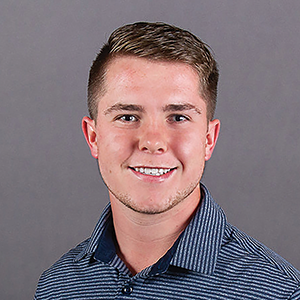
Jared Fry was recognized with the 2020 Nicholas Robins Award, the highest student award given by Utah State University.
When Huntsman alumnus Jared Fry, now a CPA with PricewaterhouseCoopers, started Huntsman’s accounting program as a freshman, he felt strongly about getting involved in activities outside of the classroom. He immediately joined the school’s chapters of Beta Alpha Psi (BAP), an honor society for accounting, finance, and information systems, and the Institute of Management Accountants (IMA) student club. He soon began participating in the school’s Volunteer Income Tax Association lab (VITA), in which accounting students prepare taxes for other students and low-income tax payers in the community. Fry became the student administrator for the VITA lab and ran its operations for four years, while also serving as the club president and vice president of BAP and IMA, respectively.
“Working in the VITA lab is kind of like being responsible for running your own practice,” said Fry. “To have that responsibility thrust on me as a 20-year-old in college exponentially helped me grow my talents.”
Fry discovered that his involvement with VITA helped him advance his knowledge and understanding of accounting while honing his interpersonal skills by interacting with people and advising them on tax strategy. His experiences with BAP and IMA gave him invaluable access to accounting professionals and the opportunity to work closely with faculty club advisors.
“I tried to overextend myself as much as I could,” Fry said, “because that’s when the most growth and development occurs— when you're pushing your own limits.”
Now in his career, Fry is still pushing his own limits. He developed an interest in coding and robotics, and was able to develop robotic tools that have automated processes and saved his company hundreds of hours on engagement.
Sometimes students, said Fry, are afraid to risk their grades by doing too many things. “As a student, it was more important for me to say I tried and did my best. I felt that I couldn’t build myself as a well-rounded professional without trying as much as I could.”
Investing in Experiential Learning
“We have made a very conscious effort of putting students and their success as our top priority,” Anderson frequently repeats. He is passionate about giving students the very best real-world learning experiences possible. “We’ve built a world-class faculty, a world-class facility, we’ve worked really hard at refining and improving the curriculum our students learn in the classroom, and we have been developing a lot of our own hands-on, outside-the-classroom learning experiences.”
In fact, over the past several years, the Huntsman School has become a premier hands-on learning center, with ongoing development of its extracurricular and experiential learning offerings. The Huntsman Scholar Program provides experiential learning requirements and mentoring for top performing Huntsman students. The Center for Entrepreneurship has launched 200 student-led businesses since 2013 and provides entrepreneurship courses and experiences for students across USU’s campus. Focused Fridays offers development workshops and guest speakers from successful businesses. The Center for Growth and Opportunity has completed over 100 student-led research projects since 2017 focused on the intersection of economics and public policy. The Stephen R. Covey Leadership Center provides leadership coaching from student mentors, opportunities to build leadership skills, and gives students the chance to pitch companies on leadership solutions.


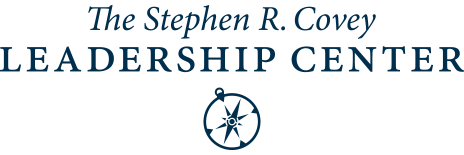





As the public health situation improves post-Covid, Huntsman will also continue its international travel programs. The globally recognized SEED program (Small Enterprise Education and Development) sends students to emerging markets for three months at a time where they teach and advise local entrepreneurs in best business management practices. The Huntsman Global Learning Experiences take students to Asia, Latin America, and Europe to experience the global economy on location. Students meet with business leaders in their offices to learn about the organizations and environments in which they operate.
“The whole idea of experiential learning, applied learning, learning opposed to teaching, has been a trend in education,” said Vijay Kannan, head of Huntsman’s Department of Management and executive director of International Programs, “but at Huntsman it is core to our identity.”
“We want our students to have big aspirations,” said Kannan. If we’re going to push our students to do more and have bigger aspirations, we need to be partners in that effort. When our students feel they have support, partners, and people who will help them achieve their goals, then we can help them be successful.”
This emphasis on learning by doing is why Huntsman plans to break ground on a new Experiential Learning Building. The 40,000 square foot, $25 million building will house Huntsman’s expanding experiential learning programs and create room for new hands-on learning initiatives, like a new Utah Data Solutions Center and the Institute for Interdisciplinary Studies. It will also include professional co-working space for student use for remote internships or other needs. The building is a part of a campaign to increase experiential learning opportunities across the school.

Renderings by Center Street Architects of the proposed experiential learning building, to be placed directly east of the current Eccles Business Building.
“This investment is all about providing more of our students with more of these transformative opportunities,” said Dave Patel, Associate Dean of Student & External Affairs at Huntsman. He recognizes that not every student will have the desire or ability to participate in multiple simultaneous extracurricular activities.
“We want to serve all of our students and ensure that every Huntsman student can participate in hands-on learning on their own terms,” said Patel. “This initiative expands capacity for us. It scales our vision of how we can partner with students in directing their own education by providing more opportunities for more students.”
One experiential program the school plans to expand is its She’s Daring Mighty Things initiative. Originally created as a one-day summit by female faculty and staff to provide female students with an opportunity to mix with and to learn from other successful female professionals, the new She’s Daring Mighty Things program would create ongoing skill and confidence building workshops, opportunities for mentorship from student peers and alumni, networking events, and scholarship support to female students.
Across the United States, and especially in the Intermountain region, female students are underrepresented in business education. The Huntsman School has made increasing female representation in their faculty and student body one of their top three priorities. Huntsman recently recruited Dr. Susan Madsen as the inaugural Karen Haight Huntsman Professor of Leadership, bringing with her the Utah Women & Leadership Project, which is focused on strengthening the impact of Utah women and girls. The recruiting of internationally known scholars such as Dr. Katarzyna Bilicka from Oxford University, and incredible teachers such as Lianne Wappett, the 2020 Teacher of the Year and 2021 Undergraduate Mentor of the Year, will directly impact students.
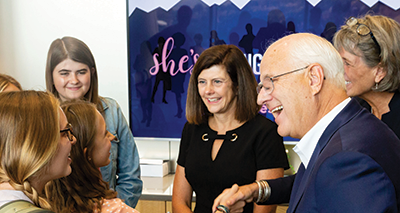
Crystal Maggelet, President & CEO of FJ Management, surrounded by students at a She’s Daring Mighty Things Summit at the Huntsman School.
“Having a dedicated space for female students and challenging them to dare mightily gives them a sense of purpose,” said Lianne Wappett, a lecturer in the Data AnalyticsandInformationSystems(DAIS)department and Huntsman Scholar Program Academic Director. “When I look at students, especially female students, I really see them as future leaders.”
She’s Daring Mighty Things is an opportunity for female students to receive the support they need to grow their professional networks, and find internships and mentors, Wappett said. “This will be a space where they can build confidence. It’s a space that can be a springboard for opportunity.”
“The She’s Daring Mighty Things initiative would reach out not just to women in the business school, but to women across the USU campus as well,” said Dean Anderson.
Experiential Learning Leads to Career Success
The opportunity for experiential learning was a major factor in Marz’ decision to transfer to the Huntsman School from another college. While at Huntsman, she has served as a University Ambassador, undergraduate teaching fellow in the Marketing Department, Hope Corps Team Lead, Entrepreneurship Center intern, and a Huntsman Scholar. Practicing concepts she learned in the classroom through these extracurriculars has helped Marz in her internship at 97th Floor, a marketing firm in Lehi, Utah.
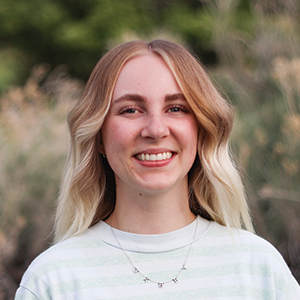
Gabby Marz, a transfer student from Snow College, is a Huntsman Scholar and USU Ambassador.
“I am able to see the details of how certain concepts function in the workplace,” said Marz. “Because I have been able to participate in experiential learning, I know that I don’t have to wait until I am handed a diploma to begin applying the principles learned in my classes.”
Research has shown that students who have the opportunity to engage in hands-on experiential learning are more likely to both land work after graduation and to be engaged and excited about their jobs, according to a 2014 study by Gallup-Purdue University.
71% of students who had useful internships in college found full-time work after graduation, compared with 56% of students who did not take part in an applied internship experience. Of the graduates who had an internship where they could apply what they were learning during college, 56% said they were engaged at work – meaning they were involved in and enthusiastic about their jobs – compared with 33% who did not.
Overall, if employed graduates felt their college prepared them for professional life, the odds that they were engaged at work nearly tripled, the study found.
“We know this formula works. Students who engage deeply inside the classroom, and participate in meaningful, outside-the-classroom activities are not only sought out first by corporate recruiters, but find meaning and contribution in their communities,” noted Patel.
McKlayne Marshall, a 2020 Huntsman graduate currently working at INVISTA, a fiber, resin and intermediates company based in Wichita, KS, agrees. His experiences at Huntsman ranged from working as an Undergraduate Research Fellow at the Center for Growth and Opportunity and a Huntsman Scholar, to participating in Focused Friday events, helping non-profit organizations, traveling in international learning trips, and even starting a family (Marshall and his wife recently welcomed their second child).
“These experiences created a rich narrative for me as I launched into my career,” Marshall said.
While student president of the Covey Leadership Fellows organization in March of 2020, Marshall – like the rest of the world – found himself in a seemingly impossible situation. The Covid-19 pandemic caused all in-person activities and classes to be cancelled, including the organization’s business case study competition called the Executive Challenge, which event organizers and competitors had been planning for many months. Marshall and the other organizers were able to move forward with the competition by rethinking the event in a virtual format and managing complicated logistics. This type of ingenuity and perseverance led to a successful event. Remarkably, the new virtual event format enabled the competition to expand to international university participants the following year.
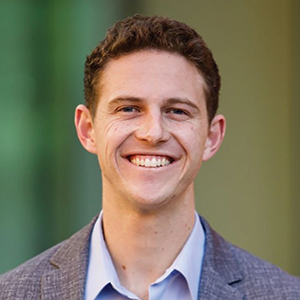
McKlayne Marshall graduated as a triple major and served in the presidencies of several student clubs.
Because of the unique education and training he received at the Huntsman School, Marshall said he’s able to look at problems differently at work and take a holistic approach to his career. He has realized the importance of principled leadership, honesty, adding value, and giving back.
“I was taught how to Dare Mighty Things, and that isn't something you learn while sitting in a classroom,” he said. “It is something that takes time, effort, love, application of knowledge, and going out there and trying something you have never done before.”
LeAnn Ravsten, a Data Analytics major and Women in Business Association member who is beginning her senior year, said she also developed skills and confidence through experiential learning that helped her during her internship as a data analyst at The Church of Jesus Christ of Latter-day Saints.
Her experience as a teaching assistant for a data analytics class during Covid taught her how to pivot and find new ways to solve problems while presenting material virtually. “This was a challenging adjustment because I had never taught classes and I thought it would be in-person instruction,” said Ravsten. “Adapting to virtual teaching [due to Covid-19] was interesting because I was not as easily able to gauge the understanding of material by the students by looking at their faces through a screen compared to in-person instruction. As the semester progressed, I was able to adjust how I presented the material. The adjustment helped me switch my perspective from ‘how can I make sure the material is taught?’ to ‘what do these students need to learn from the material and be successful in the course?’”
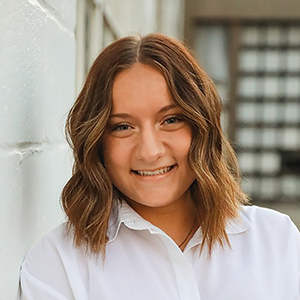
LeAnn Ravsten credits the experi- ence gained as a teaching assistant in helping her with her internship.
Later, while working on assignments during her internship, she said she would remind herself of her teaching experience, and that the best way to figure out what to do was to dive right in, start with what she knew, and then build from there.
“No matter what you are working on, keep trying different options,” Ravsten said. “Do not throw your hands up in the air saying you cannot do it. You can do it. You can figure out a solution.”
Ravsten said the experience helped her gain confidence in her knowledge and her ability to develop new skills, and it taught her to keep looking for new ways to solve problems. She also credits involved faculty for helping students prepare to enter the professional realm: “They want to see us succeed just as much as we want to see our fellow classmates succeed.”
For employers, the benefits of hiring recent graduates who explored experiential learning opportunities as students is obvious.
Kristen Ream, a Sr. Program Manager at Adobe Sales Academy, said that students catch the eye of potential employers when they come with stories highlighting their experiences, challenges they’ve faced, the outcomes and the lessons they’ve learned.
“Candidates that can use their experiences, particularly when it comes to leadership skills, critical thinking, problem solving and customer service, stand out because they show us that they’ve successfully navigated these situations and will be able to apply those skills in a corporate environment,” said Ream. “This is an absolute must when interviewing candidates and making hiring decisions.”
Paul Grant, the Chief Customer Officer for MarketStar, noted that the company’s sales teams are working for many of the biggest and brightest tech brands in the world, “so having salespeople who are prepared to sell dynamic technology solutions is a must.”
MarketStar, a corporate sponsor of the Huntsman School, also conducts an annual sales case competition at the school.
“When you create these active sales competitions, it pairs a real-life sales experience with the student’s ongoing education,” Grant said. “That combination is an amazing way for students to get ready for a big sales job. We see it from them during the competition, and we see it in our own teams through the Huntsman School students who have come to work for MarketStar."

Dr. Vijay Kannan, the head of the Management Department, exemplifies the commitment to student success through excellence in classroom instruction and close mentorship of students.
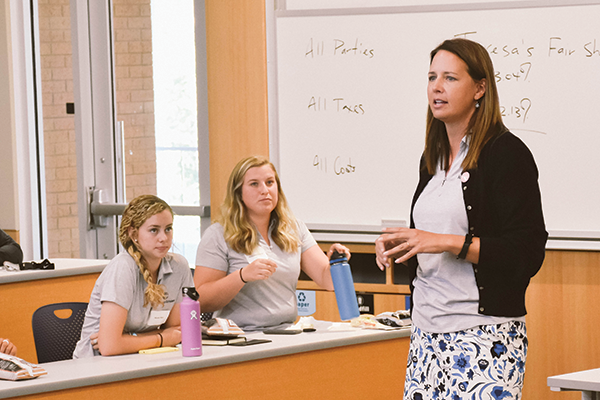
Lianne Wappett brings a wealth of professional experience and a genuine love for her students into the classroom, and has quickly become a favorite among Huntsman students.
Engaged Mentors Yield Future Leaders
The 2014 Gallup-Purdue study noting the importance of experiential learning also found that a recent graduate’s odds of being engaged at work and thriving in their overall well-being will double based on three critical elements: first, a professor who cares about them; second, a professor who makes them excited about learning; and third, a mentor who encourages them to pursue their dreams.
“We’ve noticed when a student has a personal relationship with a faculty mentor, and has the opportunity to work with that individual outside of the classroom – maybe it’s a club, maybe it’s an extracurricular activity, maybe it’s a research project – they develop an extraordinary sense of confidence and vision for what the next steps for them might be,” said Anderson.
Huntsman alumnus Lincoln Archibald, a fund consultant and CFO of startup Investment Fund Secrets, said his professors at Huntsman inspired and helped him to want to achieve great things in life.
“For me these are not just professors but lifelong friends,” Archibald said. “I still go to lunch with them. I still text them.”
Archibald added that he still receives mentorship from Paul Fjeldsted, a senior lecturer in Finance and the faculty advisor for the Economics & Finance Club, as well as other Huntsman faculty. “I’m so appreciative of their guidance and willingness to help me,” he said.
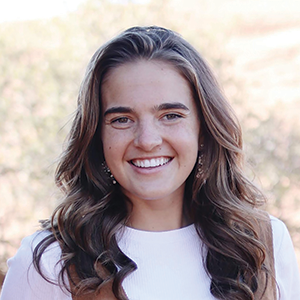
Olivia Archibald started the Happiness Project as a way to help fellow students connect with each other and increase mental wellness.
Archibald’s enthusiasm for Huntsman influenced his younger sister to also attend the business school, where she has found supportive mentorship in her professors as well.
“The Huntsman faculty makes it clear that student success is their priority, and they are willing to help us attain our goals,” said Olivia Archibald, a Finance major who serves as president of the Women In Business Association. “They never stop expressing their confidence in us.”
Archibald said she has loved having the opportunity to learn from Lianne Wappett, and have in-depth discussions about living a balanced lifestyle, including the desire for motherhood, a career, and fulfilling personal passions. “I am grateful for all the women professors and staff that have shown me that it’s all possible – that I can dream big, sit at the table, utilize agency, and lean into life with vigor and enthusiasm!”
Many Huntsman faculty also express deep satisfaction in their role as mentors.
“A lot of students at USU balance much more than classes and coursework – they work, they pay for their schooling, they might even be married,” said Wappett. “I love my job more when I can talk to a student, find out what’s going on, and hopefully be a resource to them.”
Like many of her colleagues, Wappett’s style of mentorship includes being accessible to her students. She has generous office hours and even shares her cell phone number with the students she mentors through the Huntsman Scholar Program and the Women in Business Association. During the pandemic, she realized that through “the magic of Zoom” she could hold virtual one-on-one meetings with each of her 150 students each semester.
Under Anderson’s leadership, Wappett and other faculty have fully embraced Jon Huntsman’s vision of the Huntsman School as a laboratory for creating future leaders who will make their mark on the world. They encourage students to find experiences outside of the classroom that align with their chosen fields and to not fear a course correction, as needed, while discovering a career that will bring them satisfaction.
“I think the experiential part of the college education helps define the student and helps them better understand where they thrive,” said Wappett.
Chris Skousen, Department Head of Accounting, encourages students to seek experiences that require them to gain “relevant experience that is tangible to anyone” and transferrable in any field, in addition to developing hard skills.
In these experiences, he said, “you're communicating with other individuals, leading a group, and developing soft skills pertaining to leadership, communication and organization. They may not be the technical skills required but they're helpful in any organization.”
Guiding tomorrow’s leaders is a high-stakes goal for a school nestled in “the prettiest valley in the Mountain West,” as Dean Anderson describes. But he sees investment in rich experiential learning as the critical ingredient in the school’s journey to meet Jon Huntsman’s challenge to train graduates ready to compete with the best and brightest anywhere in the world.


